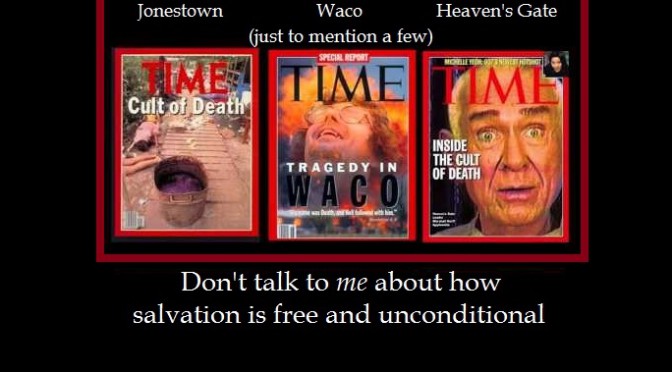A recent post on a Facebook Philosophy blog asked the question:
“Christopher Hitchens famously said “That which is asserted without evidence, can be dismissed without evidence.” Do [you] believe there are cases where someone should be respected for making assertions without evidence? Do you think those assertions should be given any credence? Discuss.” – Robert S.
Most of the posts that followed answered in the negative, that belief should be accompanied by evidence, else belief is not warranted.
While I agree with most of the posts there; i.e. that you need evidence before believing something; the question was stated: “Do [you] believe there are cases where someone should be respected for making assertions without evidence“? I had to consider instances where it might actually be warranted.
I would think that a lot of it would depend on the person making the claim, and the cost to you for believing or not believing that claim. Let’s say your close friend tells you not to eat that apple in your hand; and claim it has been poisoned with pesticides. You know that your friend is a farmer, the apple came from his farm, and he uses pesticides. He gives you no evidence, so that is a claim without evidence. But since he’s a close friend and has proved himself many times to have your best interests at heart, and is in a position to know such things, then don’t eat the apple. It only costs you the apple, and not believing him could cost you your life.
However, if he said you should never eat any fruit again because someone is out to get you, well, that action could cost you much pleasure, and many essential nutrients, for the rest of your life. You would demand VERY good evidence for that claim before entertaining it; at least before you hire a full-time food taster.
Now, consider that this. A close loved-one tells you that if you must “believe” in Jesus, and accept him into your heart as your “savior”, or else you’ll go to hell. You might think that there is no cost to you and that you’re avoiding excruciating pain for eternity. But really, the costs to you could be very substantial. That belief could potentially put you and your family in the power of a church hierarchy, and cost you 10% of your earthly income. It could also persuade you to change your life’s purposes to those decided on by the church. These effects would last for the rest of your life. All of this in order to avoid a possible after-life when no one is in a position to know for sure what happens after death. Especially so, when there are other religions who claim, just as passionately, that if you believe in Jesus you’re consigning yourself to THEIR hell.
Belief without evidence is never warranted, but if the costs are small, and the benefit high, you might entertain some beliefs without much harm. But even in those cases they should only be maintained until such time as they may be validated with whatever evidence you can find. If evidence should not come to hand, then it would behoove you to let those beliefs fall away.
However, if the potential costs are large and you can withhold belief without imminent harm, or at least until evidence is presented, then do so. But be sure to find those costs. Don’t ignore or minimize the real costs of believing without evidence. They can be quite substantial.
Think about those young Muslim men who flew those planes into the Twin Towers and the Pentagon, do you think that when they were very young, and being taught about the unconditional love of Allah and Muhammad, that they would ever have considered that their young lives might end up being the cost of their beliefs?
Think about the followers of Jim Jones, David Koresh or Marshall Applewhite (Heaven’s Gate). Think about Andrea Yates, who murdered her five children to save them from growing up in sin and going to hell. Think about those people in the audience of faith healer Peter Popoff, when he told them to throw their prescription drugs up on the stage because they were healed and wouldn’t need them anymore.
And think about all the old and infirm people who routinely send what little money they have to televangelists to theoretically help them spread the gospel of Jesus Christ, when all they are really doing is helping the evangelists live a lavish life-style, while they do without.
The wilder the claim, the more and better evidence you should demand; extraordinary claims require extraordinary evidence. Look around and ask yourself; are there others who withhold belief without cost? Or are they paying a high cost for their beliefs? And, you might also ask yourself, why churches try to convert children before they have the mental capacity to effectively evaluate these beliefs and their costs?
Belief without evidence has very real costs. Think, evaluate and then decide. You’re going to be the one who will pay for your belief decisions. Be sure to consider all the costs.

